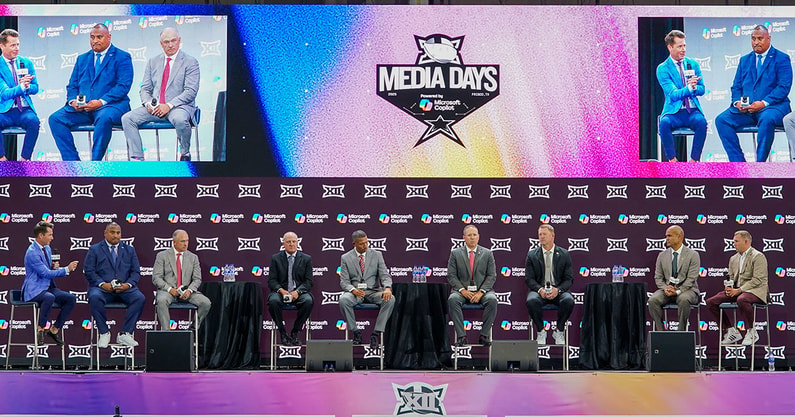Big 12 coaches call for clarity across college football: 'We don't even know the rules'

Scott Frost spent the 2024 season in the NFL as an analyst with the Los Angeles Rams. It marked a career shift for the former Nebraska head coach, who’s now back in the same role at UCF, where he worked from 2016-17.
Frost’s return to college football comes as the sport enters a new era. With approval of the House v. NCAA settlement, revenue-sharing officially arrived July 1. Schools are able to directly share up to $20.5 with athletes, and the majority of those funds are largely being directed toward football.
But when it comes to operating with a salary cap, Frost saw what life was like in the NFL. That’s why he, along with some fellow Big 12 coaches, called for clarity on rules during the league’s media days on Tuesday and pointed out issues he sees with the influx of NIL dollars as teams build rosters.
“I think there’s things that concern a lot of us. … At least in the NFL, you know what the rules are. You know what the salary cap is,” Frost said during a roundtable led by ESPN’s Matt Barrie. “Right now, at the end of the day, things are decided on the field. But way before that, they’re decided in bank accounts. That needs to be leveled out, like Coach [Dave Aranda] said. If there’s some enforcement and everybody’s playing by the same rules, I think it’s a better game.
“It’s a sad state of affairs in college football if he who has the richest boosters wins. And I don’t think that’s where anybody wants it or where it was intended to be.”
Scott Satterfield: The landscape is ‘ever-changing’
In addition to ushering in the rev-share era, the House v. NCAA settlement also brought roster limits and a clearinghouse to vet NIL deals. A system run by Deloitte, deals worth more than $600 will have to be submitted to NIL Go and approved.
The goal of the 10-year agreement is to bring stability to the college sports landscape, and football is front and center. The intersection of NIL and the transfer portal created questions about “guardrails” over the last four years.
To Cincinnati’s Scott Satterfield, the landscape changed so quickly once NIL came to college athletics. Now, he said, it’s time for stability – and it starts with enforcement.
Top 10
- 1New
SEC Football
Preseason rankings updated
- 2
Kirby Smart
Doesn't mince words on CFP
- 3
Arch Manning
Reacts to Steve Spurrier comment
- 4Trending
Steve Sarkisian
Introduced to 'Aggie War Hymn'
- 5Hot
Top 50 hardest schedules
Toughest slates revealed
Get the Daily On3 Newsletter in your inbox every morning
By clicking "Subscribe to Newsletter", I agree to On3's Privacy Notice, Terms, and use of my personal information described therein.
“I think certainly … having some boundaries about what we have to do and what we can’t do,” Satterfield said. “I think sometimes, we sit here and talk and like, we’re in the profession and we don’t even know the rules.
“It’s difficult and it’s ever-changing, and there’s not anything that’s been very stable, really, since 2020. Things have changed so much and so fast. So hopefully, we can garner this and set some boundaries, some rules and then there are going to be some ramifications if someone does break the rules.”
‘Tell us where the sandbox is and we’ll play in it’
With regard to clarity, Arizona State coach Kenny Dillingham took the same approach to his colleagues on the stage at The Star in Frisco. He simply wants to know what teams can and can’t do as the new era officially begins.
But when it comes to the monetary side of the equation, Dillingham’s mindset is more about developing players both on and off the field. That’s why he just wants answer, so long as it’s a level playing field and he can focus on football.
“Just to create some standards – whatever it is,” Dillingham said. “I don’t think anybody cares what the rules are. They just want to know the rules. Tell us where the sandbox is and we’ll play in it. At the end of the day, this a game. I know this is a business, I know it’s a profession to everybody. But if anybody who’s not in this to see a kid go from an 18-year-old kid to a 22-year-old man and enter the real world, is in it for the wrong reasons.
“I think people always focus on the negative and the changing of college football. The reality is we get to impact a lot of young people every single day, and we should do it with every single power that we have in our body to help these kids achieve success in life.”